Stay connected with clients, boost retention rates, and grow your practice with the right email marketing platform.
Client retention is the lifeblood of any successful accounting practice. It costs 5X more to get a new client than to retain the ones you have, and increasing your accounting firm’s retention rate by just 5% can boost profits by more than 25%. If you’ve been relying solely on face-to-face meetings and phone calls to stay connected with clients, you’re missing out on one of the most cost-effective retention strategies available: email marketing.
I’ve been helping accounting firms implement digital marketing strategies, working with everyone from solo practitioners to mid-size CPA firms. During that time, I’ve tested dozens of email marketing platforms specifically for their effectiveness in the accounting sector. The tools that work best for e-commerce brands or lifestyle bloggers often fall short when it comes to the unique needs of accounting professionals.
Email marketing offers a more cost-efficient method for accounting professionals to interact with their target audience, with an average ROI of $36 per $1 spent. But here’s what most accounting firms get wrong: they think email marketing is just about sending newsletters. The most successful firms I work with use email strategically to nurture relationships, educate clients, and position themselves as trusted advisors, not just number crunchers.
This isn’t about replacing the personal touch that makes accounting relationships work. It’s about enhancing those relationships with consistent, valuable communication that keeps you top-of-mind year-round, not just during tax season.
The best email marketing software for accounting firms

Mailchimp for overall features and integrations
ConvertKit (Kit) for simplicity and automation
Constant Contact for established firms wanting full-service marketing
Brevo for budget-conscious practices with CRM needs
SendX for agencies managing multiple accounting clients
Moosend for advanced automation on a budget
ActiveCampaign for sophisticated client journey mapping
How email marketing drives client retention for accounting firms
Email marketing works for accounting firms because it solves three critical retention challenges:
Staying top-of-mind beyond tax season. Most clients only think about their accountant when they need something. Regular, valuable email communication keeps your firm in their thoughts year-round, making them less likely to shop around when renewal time comes.
Building trust through education. Informative content that provides value to the reader will tend to position the sender in a position of authority on the subject matter. Useful tax tips, industry insights, or regulatory updates relevant to the email contact segment will help nurture long-term client relationships.
Personalizing communication at scale. Every client is unique, and you should treat them as such. Business software now allows multiple people in your firm to answer precise account questions that once had to go to the client’s accountant.
The most effective accounting firms use email to share timely updates (like tax law changes), educational content (like expense tracking tips), and personalized check-ins that show they care about their clients’ success beyond just filing returns.
What makes the best email marketing software for accounting firms?
Compliance and security features. Accounting firms need to adhere to strict data protection regulations such as the General Data Protection Regulation (GDPR) or the California Consumer Privacy Act (CCPA). Look for platforms that offer robust security, data encryption, and compliance tools.
Professional templates and customization. Your emails should reflect the professionalism of your practice. The best platforms offer clean, business-appropriate templates that you can customize with your branding without looking like a generic newsletter.
List segmentation and automation. Not all clients have the same needs. You should be able to send different content to business clients versus individual tax clients, or create automated sequences for new client onboarding.
Integration capabilities. Your email platform should work seamlessly with your existing accounting software, CRM, or practice management tools to avoid duplicate data entry and ensure accurate client information.
Deliverability and reputation management. Even the best email content is useless if it ends up in spam folders. Look for platforms with strong deliverability records and features to help maintain your sender reputation.
Value for money. Accounting firms typically operate with careful attention to ROI. The best platforms offer transparent pricing that scales reasonably as your client list grows.
I’ve tested these criteria extensively across multiple accounting firms, from solo practitioners managing 50 clients to regional firms with thousands of contacts. The platforms I’m recommending have proven themselves in real-world accounting environments, not just in marketing demos.
The best email marketing software for accounting firms
Best overall: Mailchimp
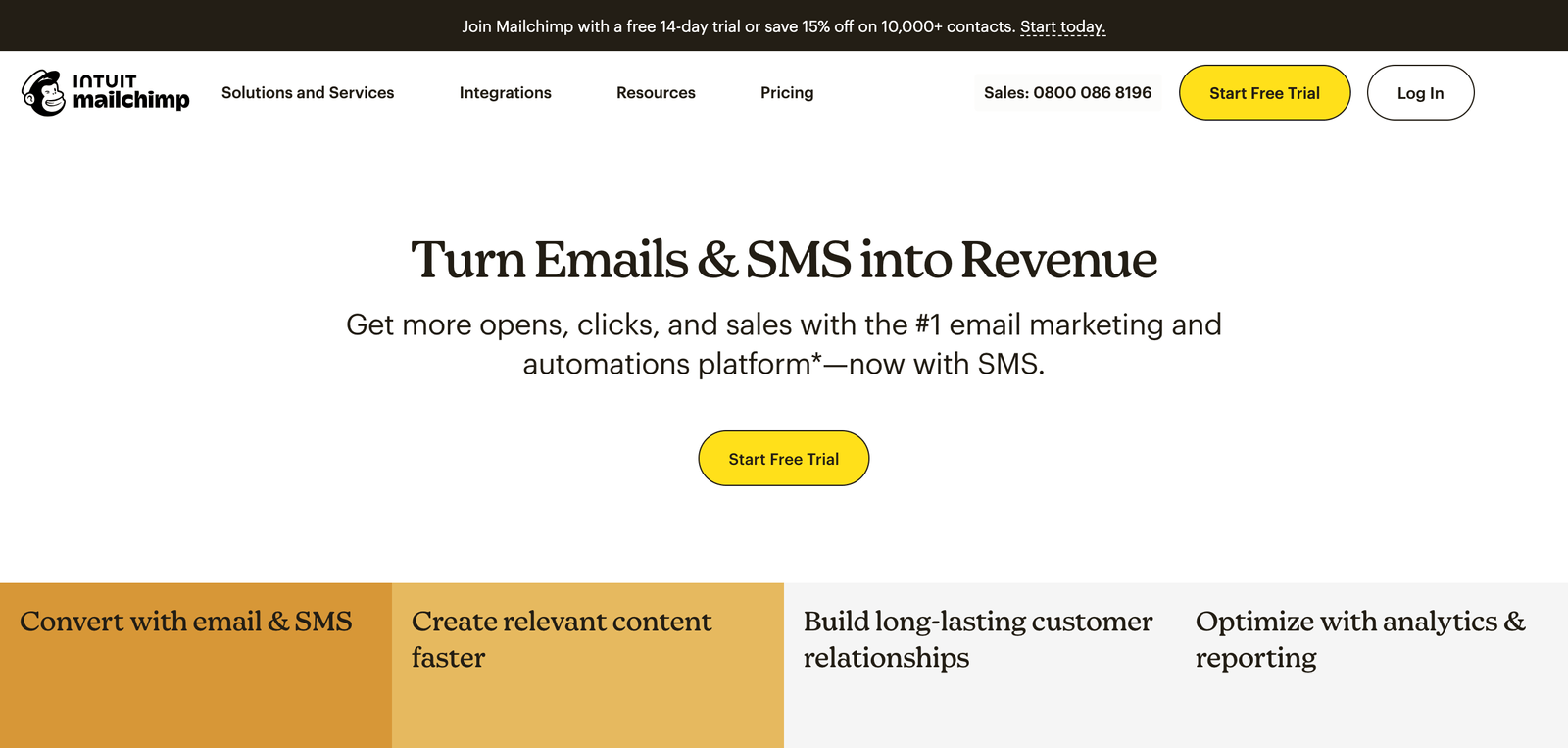
Mailchimp pros:
- Industry-leading templates and design tools
- Extensive integration ecosystem including QuickBooks
- Robust automation and segmentation features
- Strong deliverability rates
Mailchimp cons:
- Pricing has become quite expensive, especially for larger lists
- Advanced features require Standard plan starting at $90 for 5,000 users
- Can be overwhelming for beginners
Mailchimp is the #1 email marketing and automation platform based on December 2023 publicly available data on competitors’ number of customers. For accounting firms, Mailchimp offers several advantages that make it worth the premium pricing.
The platform excels at creating professional-looking emails that reflect well on your practice. Their template library includes several business-appropriate designs that work perfectly for accounting firms. The drag-and-drop editor is intuitive enough that anyone in your office can create good-looking emails without design experience.
Where Mailchimp really shines for accounting firms is in its automation capabilities. You can set up welcome sequences for new clients, seasonal reminders about tax deadlines, and follow-up campaigns for different service offerings. The segmentation tools let you easily separate business clients from individual clients, or create specific groups for different industries you serve.
The QuickBooks integration is particularly valuable, allowing you to sync client data and create targeted campaigns based on their accounting activity. You can automatically add new QuickBooks clients to specific email lists or trigger emails based on certain accounting events.
Mailchimp pricing: Free plan includes up to 500 contacts and 1,000 monthly emails.
Best for simplicity: ConvertKit (Kit)
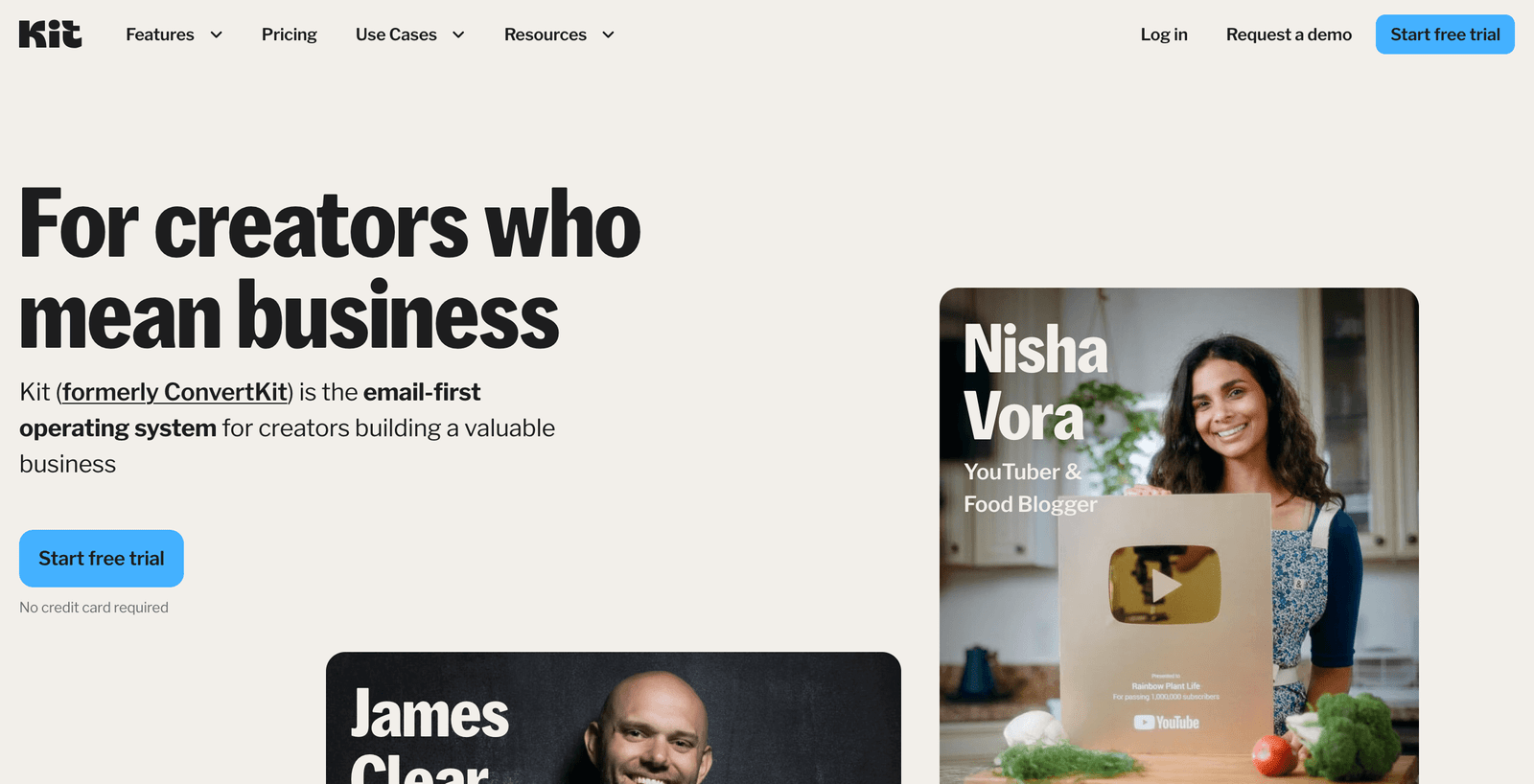
ConvertKit pros:
- Intuitive user interface designed for simplicity, allowing users of all technical levels to manage campaigns without confusion
- Excellent automation builder
- Creator-focused features work well for thought leadership
- Doesn’t charge for unsubscribed & duplicate subscribers
ConvertKit cons:
- Pretty expensive compared to other services
- Limited design templates
- Less robust integration ecosystem
ConvertKit (recently rebranded as Kit) takes a different approach than Mailchimp. Instead of trying to be everything to everyone, it focuses on making email marketing simple and effective for professionals who want to build authority in their field.
For accounting firms, this philosophy translates into tools that help you position yourself as a trusted advisor rather than just a service provider. The platform makes it easy to create educational email courses, send regular insights about tax law changes, or share industry analysis that demonstrates your expertise.
The visual automation builder is particularly user-friendly. You can easily create workflows like: new business client signs up → receives welcome email → gets quarterly tax planning reminders → receives year-end preparation checklist. These automations help ensure no client falls through the cracks while reducing manual work for your team.
ConvertKit’s free plan allows users to email up to 10,000 subscribers, a major increase from the previous 1,000-subscriber limit. However, the free plan is quite limited in features, and you’ll need a paid plan for most professional use cases.
ConvertKit pricing: Free for up to 1,000 subscribers (limited features).
Best for established firms: Constant Contact
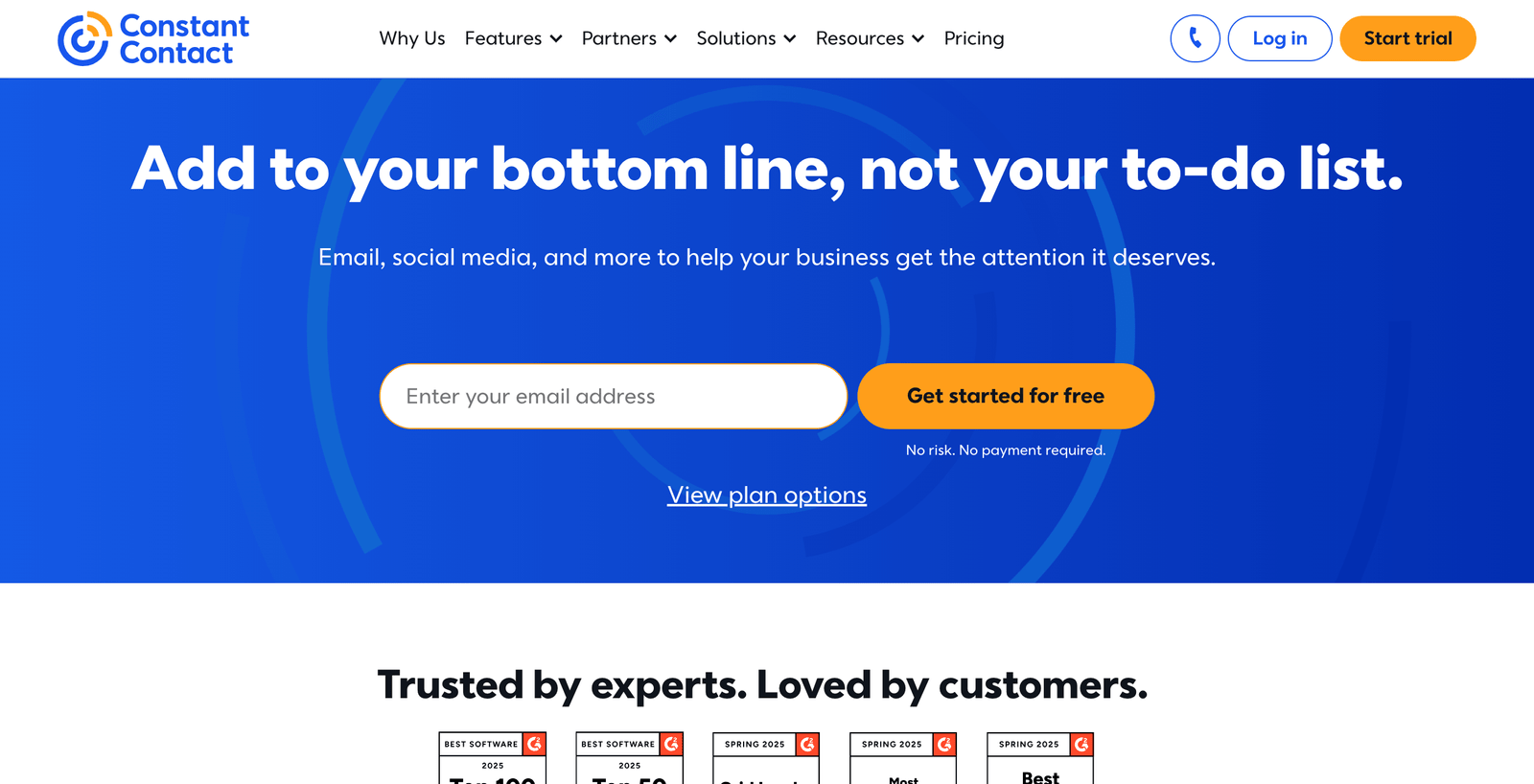
Constant Contact pros:
- 97 percent email delivery rate, a critical factor for small businesses
- Excellent customer support and training resources
- Event management features perfect for firm seminars
- Strong social media integration
Constant Contact cons:
- Steep starting price tag of $12/month for 500 subscribers
- Overage fees of $0.002 per email if you exceed monthly limits
- Limited automation compared to newer platforms
Constant Contact has been serving small businesses longer than almost any other email platform, and their experience shows in their feature set designed specifically for professional services.
Businesses earn $36 for every $1 spent on email marketing, and Constant Contact makes it easy to achieve these returns with features tailored to accounting firms. Their event management tools are particularly valuable for firms that host tax seminars, webinars, or client appreciation events.
The platform includes robust contact management features that help you organize clients by service type, industry, or engagement level. You can easily create campaigns for specific client segments—like sending tax law updates only to business clients or year-end planning reminders to high-net-worth individuals.
Constant Contact’s strength lies in its full-service approach. They offer extensive support, training resources, and even design services if you need help creating professional campaigns. For busy accounting firms that want effective email marketing without a steep learning curve, this support can be invaluable.
Constant Contact pricing: Lite plan starts at $12/month, Standard plan at $35/month, and Premium plan at $80/month. 60-day free trial available.
Best for budget-conscious practices: Brevo (formerly Sendinblue)
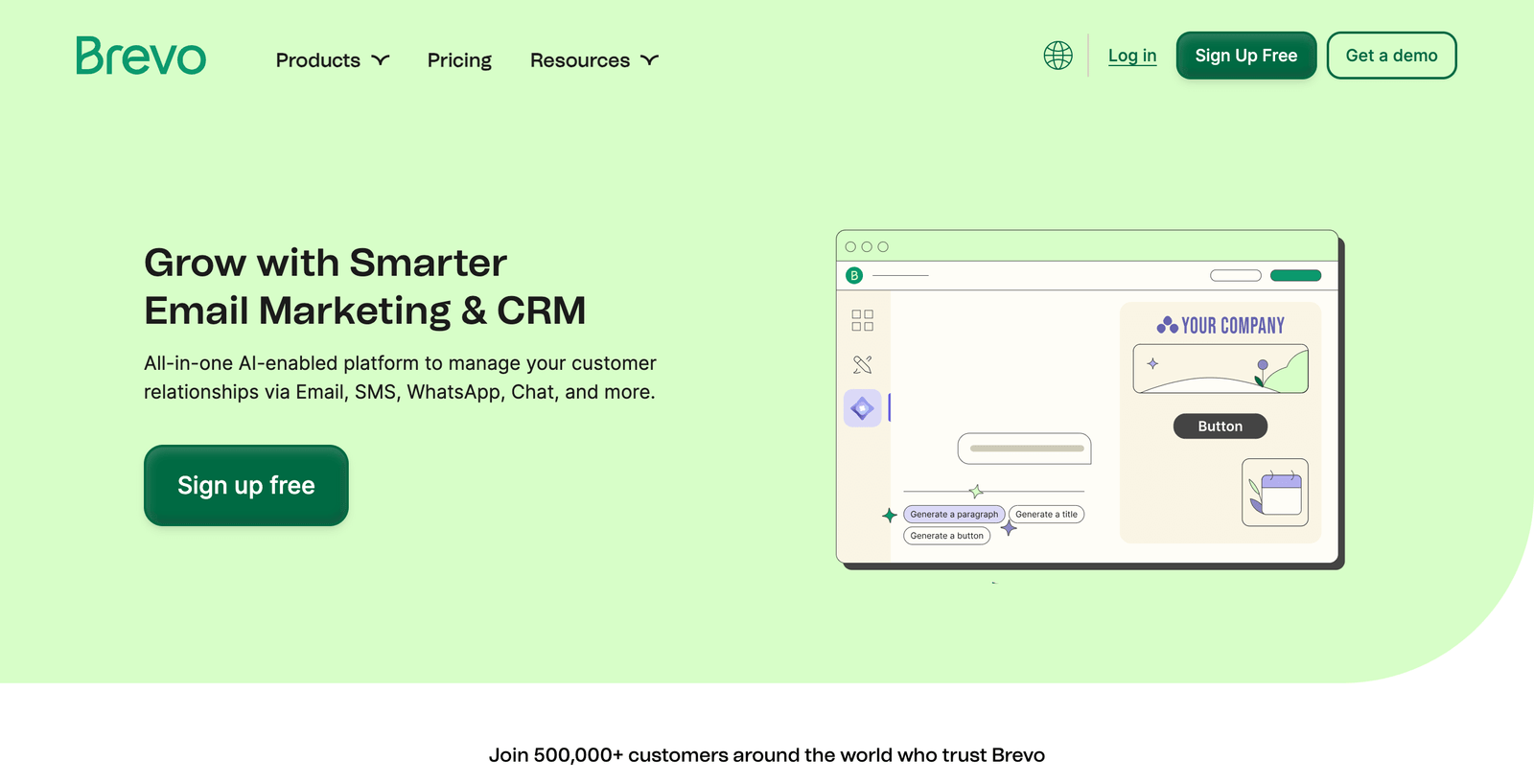
Brevo pros:
- Free account includes automation, segmentation, and analytics
- Built-in CRM features
- SMS marketing included
- Transparent pricing with no hidden fees
Brevo cons:
- Limited design support with just 40+ templates to start with
- Fewer third-party integrations than competitors
- Email editor can feel basic compared to premium platforms
Brevo stands out for offering premium features at budget-friendly prices. Brevo offers the best free plan because it doesn’t limit the number of subscribers you can add. This makes it particularly attractive for growing accounting practices that need to be mindful of marketing expenses.
The platform includes CRM functionality alongside email marketing, which is perfect for accounting firms that don’t already have a robust client management system. You can track client interactions, manage contact details, and trigger emails based on CRM activities, all from one platform.
For accounting firms, Brevo’s transactional email capabilities are particularly useful. You can send automated appointment confirmations, invoice notifications, or service completion updates that maintain consistent communication throughout the client relationship.
The automation features are surprisingly robust for a budget platform. You can create sophisticated workflows for client onboarding, seasonal communications, and service follow-ups that rival much more expensive platforms.
Brevo pricing: Free plan with unlimited contacts.
Best for agencies: SendX
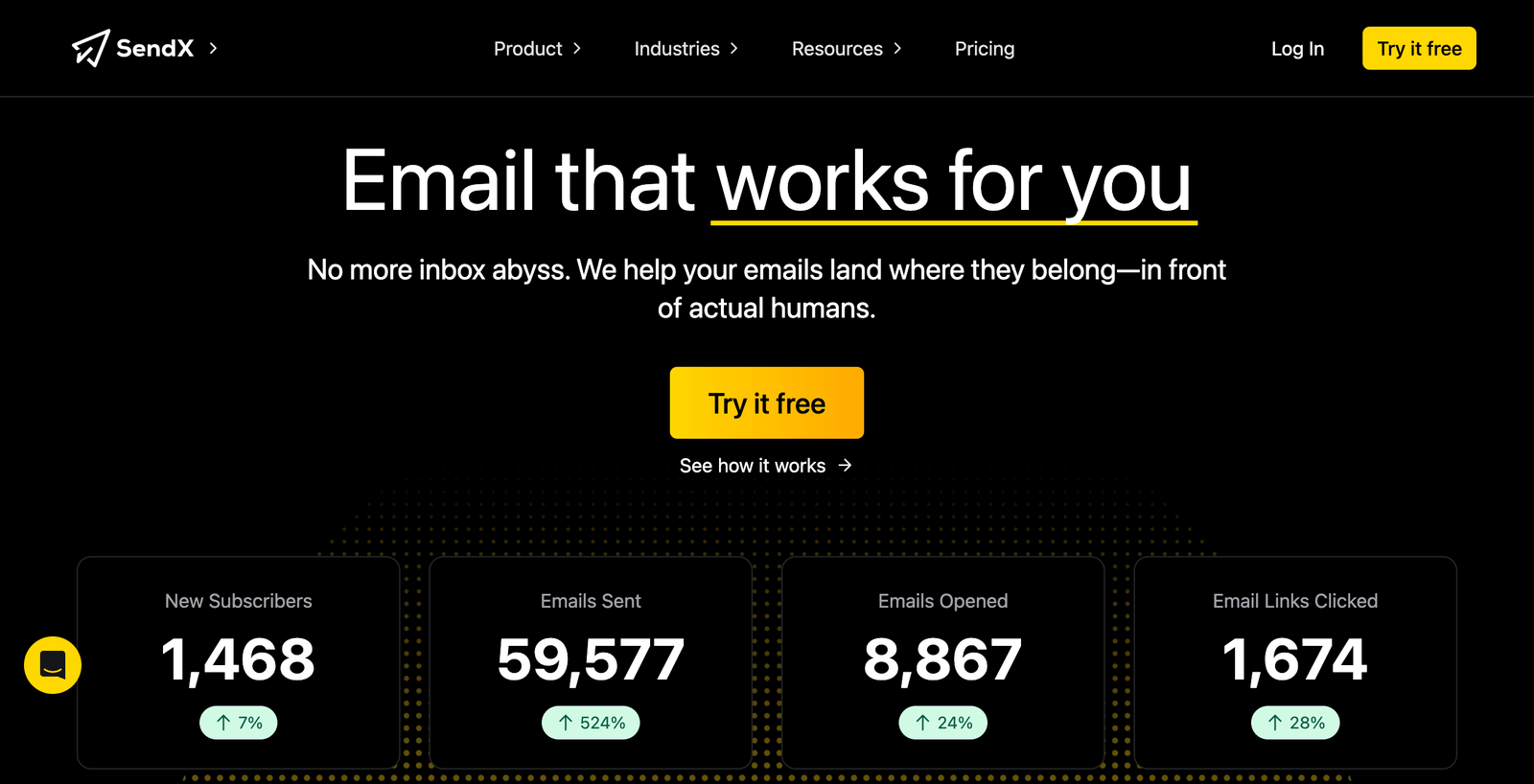
SendX pros:
- Unlimited email sends to your opted-in subscribers
- Excellent customer support
- Advanced automation capabilities
- White-label options available
SendX cons:
- Less well-known brand
- Fewer template options than major competitors
- Limited free plan
SendX is particularly well-suited for agencies or larger accounting firms that manage multiple client communications or want to offer email marketing as an additional service to their accounting clients.
SendX optimizes your email campaigns based on 30+ parameters including past open behavior, timezone, domain name, email client, ISP etc. This level of optimization can significantly improve engagement rates for accounting firms that serve clients across different time zones or industries.
The platform’s unlimited sending policy is particularly valuable for accounting firms that need to send frequent communications during tax season or quarterly reporting periods without worrying about overage charges.
SendX also offers migration services, making it easy to switch from other platforms without losing your existing email lists or automation setups.
SendX pricing: Plans start at $9.99/month for up to 1,000 subscribers with unlimited emails and advanced features included.
Best for advanced automation: Moosend
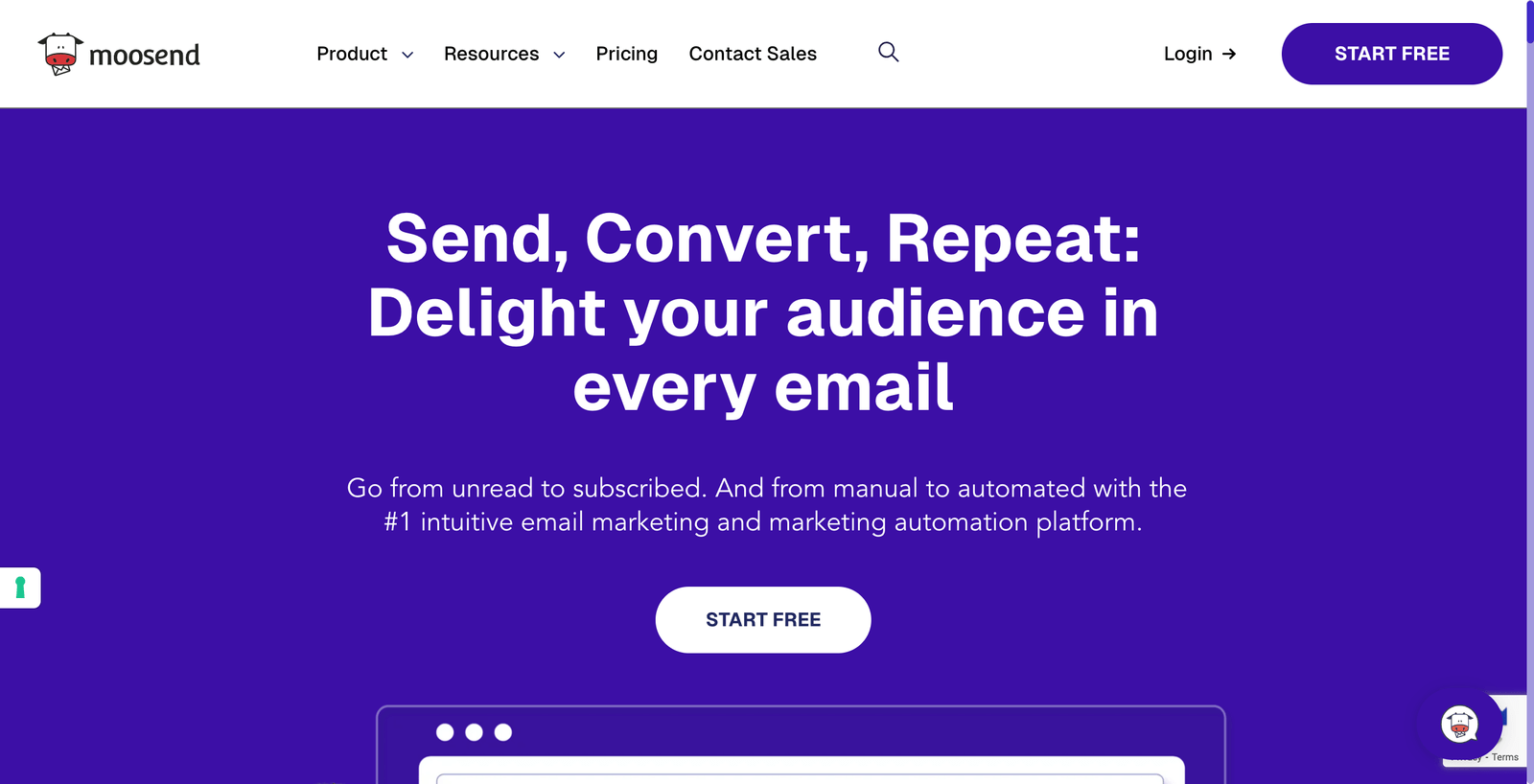
Moosend pros:
- Pro starts from $9/month with unlimited emails, 500 contacts, 5 users, automation workflows, landing pages, transactional emails, and more
- Advanced segmentation capabilities
- Comprehensive analytics
- Generous free plan
Moosend cons:
- Less intuitive interface than some competitors
- Fewer integrations with accounting software
- Smaller template library
For accounting firms that want sophisticated automation without the premium price tag, Moosend offers an impressive feature set at competitive prices. The platform excels at creating complex, behavior-based email sequences that can nurture client relationships over time.
You can create detailed automation workflows based on client actions, engagement levels, or specific dates (like tax deadlines). This makes it easy to maintain consistent communication while ensuring each client receives relevant, timely information.
The analytics features are particularly robust, providing detailed insights into email performance, client engagement patterns, and ROI tracking that can help justify your marketing investment to partners or stakeholders.
Moosend pricing: Free plan for up to 1,000 subscribers. Pro plan starts at $9/month.
Best for sophisticated client journeys: ActiveCampaign
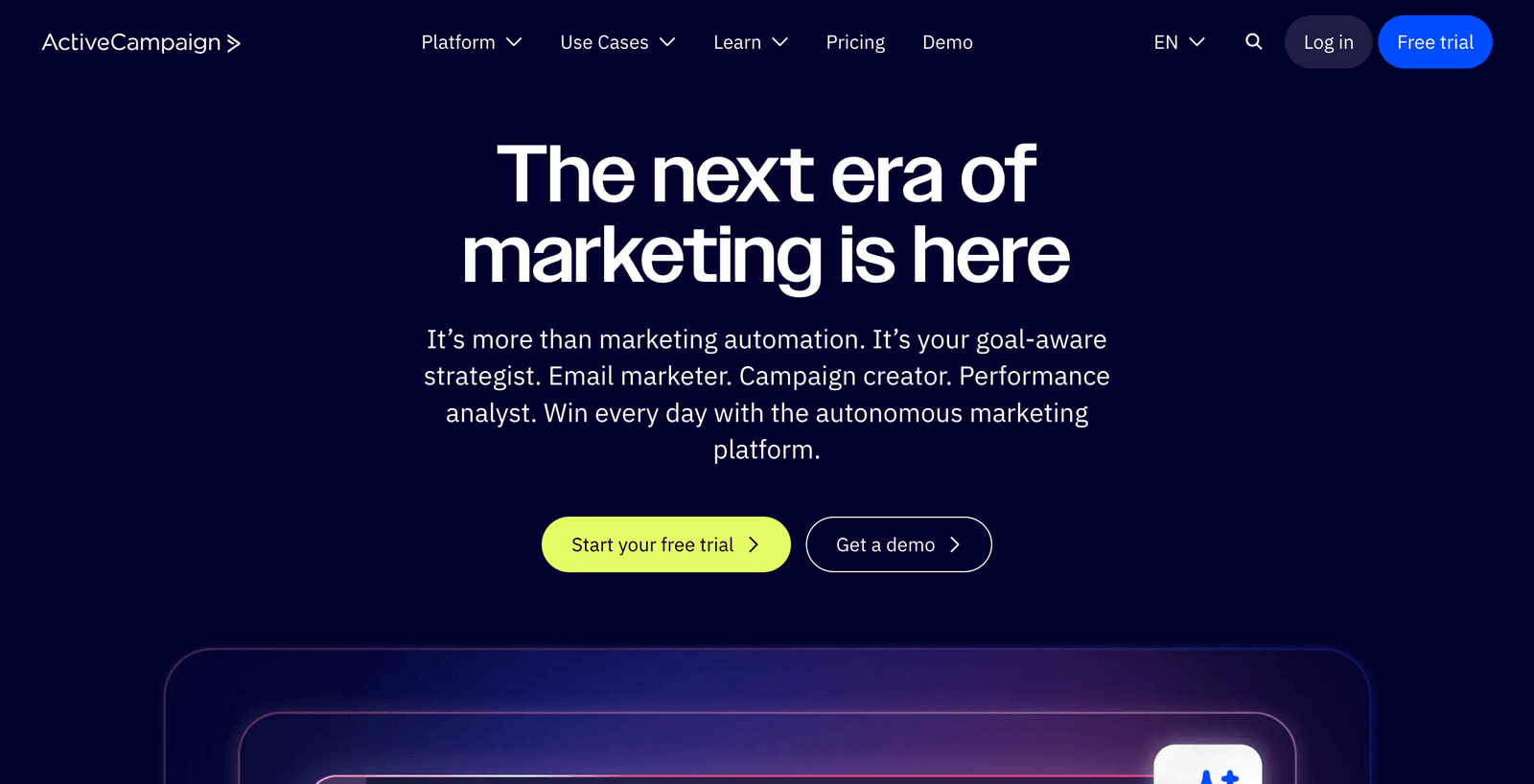
ActiveCampaign pros:
- Industry-leading automation capabilities
- Robust CRM integration
- Advanced personalization features
- Excellent deliverability rates
ActiveCampaign cons:
- Steeper learning curve
- Higher pricing for advanced features
- Can be overwhelming for simple use cases
ActiveCampaign is the choice for accounting firms that want to create sophisticated, personalized client experiences. The platform’s strength lies in its ability to track detailed client behaviors and trigger highly targeted communications based on specific actions or characteristics.
For accounting firms, this means you can create detailed client journeys that automatically adjust based on each client’s needs, engagement level, and service history. You might send different content to a new business client versus a long-term individual client, or trigger specific follow-ups based on which services they’ve used.
The CRM integration is particularly valuable for larger accounting firms that need to coordinate email marketing with sales activities and client management. You can track the entire client lifecycle from initial inquiry through long-term retention.
ActiveCampaign pricing: Starter plan starts at $15/month for up to 1,000 contacts, with Plus at $70/month and Professional at $187/month.
Other email marketing tools worth considering
Several other platforms deserve mention for specific use cases:
HubSpot offers a free CRM with basic email marketing that’s perfect for firms just starting out. Some of the top platforms when it comes to email marketing for accounting firms include HubSpot and Klaviyo.
GetResponse provides excellent value with built-in send-time optimization and four types of A/B testing, starting at just $0 per month for up to 1,000 contacts.
MailerLite offers a clean, user-friendly interface with generous free plan limits and reasonable pricing as you scale.
AWeber remains a solid choice for firms that prioritize deliverability and simple automation over advanced features.
How to choose the right email marketing software for your accounting firm

Start by assessing your current client communication needs. Are you looking to:
- Stay in touch with existing clients between tax seasons?
- Educate clients about new tax laws or financial strategies?
- Generate referrals through thought leadership content?
- Streamline client onboarding and service delivery?
Your primary goals should guide your platform choice. If you’re just starting out and want something simple, ConvertKit or Brevo might be ideal. If you’re an established firm that wants comprehensive features and support, Constant Contact or Mailchimp might be worth the premium.
Consider your technical comfort level and available resources. Some platforms require more setup and maintenance than others. Running an accounting practice is already a full-time job, so choose a platform that fits your available time and technical skills.
Think about integration needs. If you’re already using practice management software, QuickBooks, or a CRM, look for email platforms that integrate seamlessly with your existing tools.
Finally, consider your growth trajectory. As your firm grows, Mailchimp offers paid plans with advanced features like multi-step automations, A/B testing, and enhanced analytics to support your growth. Choose a platform that can scale with your practice.
Best practices for email marketing in accounting firms
Focus on education over promotion. People read newsletters to learn something that will help them, not to hear a sales pitch. It’s ok to mention your services but if your newsletters are too salesy, people will quickly unsubscribe.
Maintain consistent communication. You don’t have to send an email every week, but aim for at least one email per month. This keeps you top-of-mind with your audience and shows that you’re reliable.
Personalize your content. Use segmentation to send relevant content to different client groups. Business clients might want tax planning strategies while individual clients need personal finance tips.
Time your communications strategically. Through these platforms, you can send out themed newsletters to your accounting marketing clients that’s timely, like a newsletter with a featured article for seasons or events such as the cybersecurity awareness month.
Use clear calls-to-action. Whether you want clients to schedule a consultation, download a resource, or simply reply with questions, make your desired action clear and easy.
Wrapping up
Email marketing for accounting firms is evolving beyond simple newsletters. We’re seeing increased integration with AI-powered personalization, automated client check-ins based on accounting software triggers, and sophisticated client journey mapping that considers the entire relationship lifecycle.
Marketing is often confused with sales and business development. Marketing, on the other hand, is the process of understanding a market’s needs, tailoring your offerings to those needs, generating awareness for a firm’s services and encouraging qualified prospects to reach out and request more information.
The most successful accounting firms are using email marketing as part of a broader digital strategy that positions them as trusted advisors rather than just service providers. This shift from transactional to advisory relationships is where the highest value, and highest retention rates, are found.
As client expectations continue to evolve, email marketing will likely become even more important for maintaining the personal touch that makes accounting relationships work, while scaling your communication efficiently across a growing client base.
The tools I’ve outlined in this guide provide the foundation for building those stronger client relationships. Choose the one that fits your current needs and growth goals, but don’t wait to get started. Client retention rate strongly impacts profitability, and email marketing remains one of the most cost-effective ways to improve those rates.

